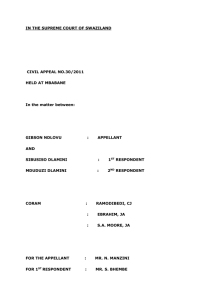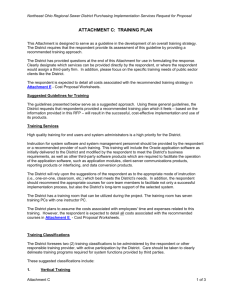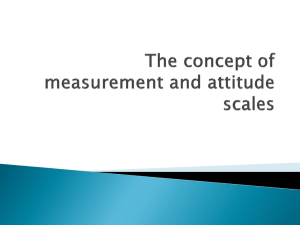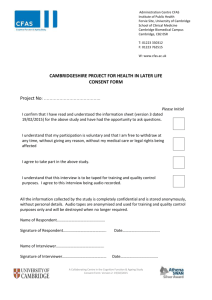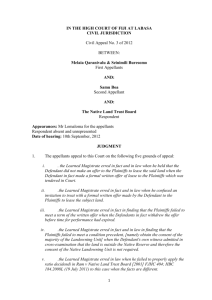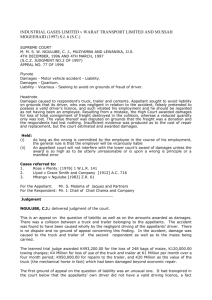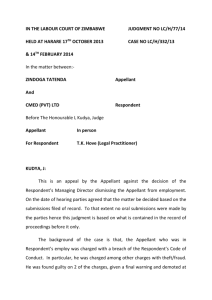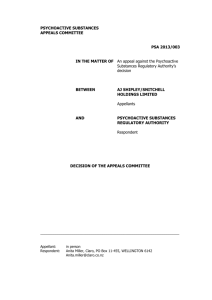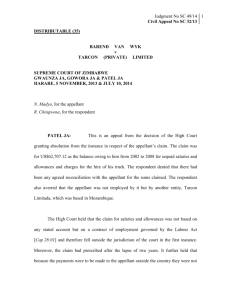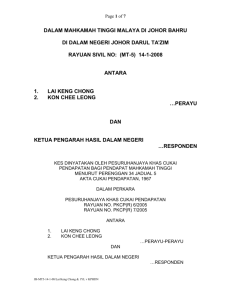tasila mwanza & another vs stephen mwanza
advertisement
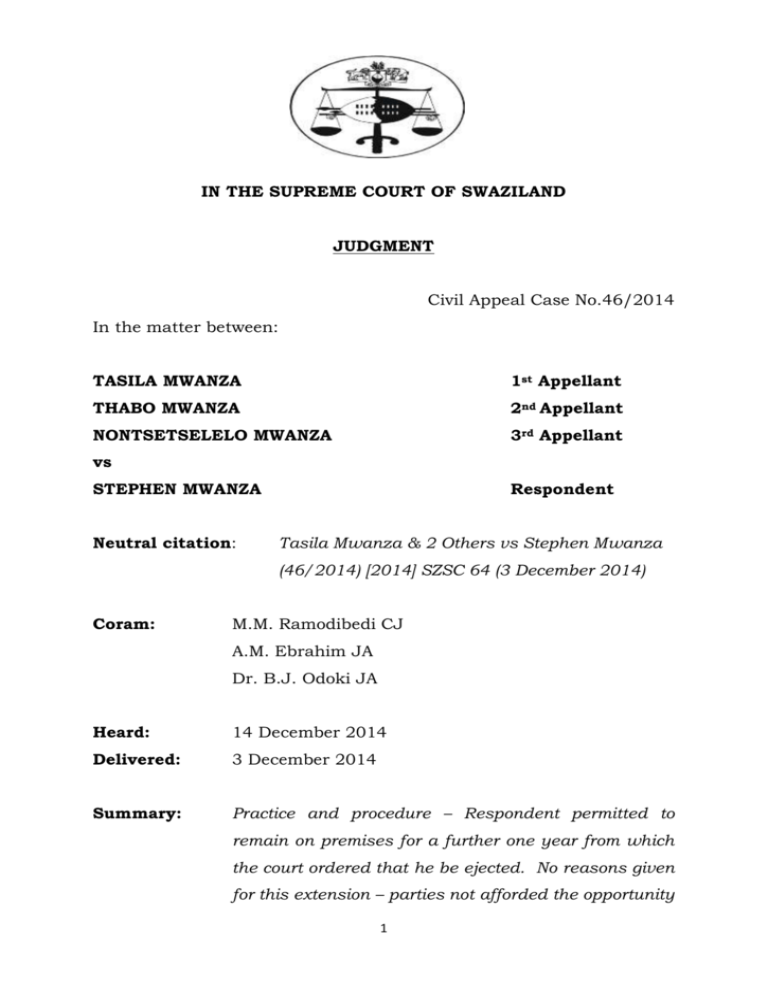
IN THE SUPREME COURT OF SWAZILAND JUDGMENT Civil Appeal Case No.46/2014 In the matter between: TASILA MWANZA 1st Appellant THABO MWANZA 2nd Appellant NONTSETSELELO MWANZA 3rd Appellant vs STEPHEN MWANZA Neutral citation: Respondent Tasila Mwanza & 2 Others vs Stephen Mwanza (46/2014) [2014] SZSC 64 (3 December 2014) Coram: M.M. Ramodibedi CJ A.M. Ebrahim JA Dr. B.J. Odoki JA Heard: 14 December 2014 Delivered: 3 December 2014 Summary: Practice and procedure – Respondent permitted to remain on premises for a further one year from which the court ordered that he be ejected. No reasons given for this extension – parties not afforded the opportunity 1 to address the court on this issue – Matter remitted to the judge a quo to afford parties to do so – No order as to costs. JUDGMENT EBRAHIM JA: [1] This case arose out of a family dispute. Where it is necessary to do so, I will refer to the individuals by their first names. [2] The three appellants are the children of the late Andrias Mwanza, who was the younger brother of the respondent. Andrias died in December 2003 and was at the time of his death owner of a plot at Manzini. On this plot were built three two-bedroomed houses, one of which was occupied by the respondent. Andrias himself did not live on the property. The respondent built the house in which he resided, and he claims to have provided the funds to build the other houses, as well as effecting other improvements. The evidence on exactly who built and paid for what is not entirely clear, but there seems no dispute that the respondent built at least the house in which he lived. There also seems to be no dispute that he has lived there since around 1988-1989. 2 [3] The second and third appellants were minors at the date of Andrias’ death but have since attained their majority. [4] After Andrias’ death, problems arose. The first appellant stated in her founding affidavit that she and the respondent signed an agreement to the effect that if the property were to be sold, he should be given “first choice” to buy it. She refers to the agreement as being annexure TM5 to her founding affidavit, though TM5 is in fact a letter from the respondent’s attorneys. TM6 (page 22), on the other hand, does appear to be an agreement between the respondent and the first appellant, but its effect is not very clear. The date is obscured, but could be 11 October 2007. The agreement in TM6 does not purport to give the respondent “first choice”, but could be interpreted as meaning that the property be sold and the proceeds divided between the respondent and the appellants. It is not necessary in this appeal to decide this point, nor is it necessary to decide whether the agreement can be enforced against the appellants. [5] The first appellant and the respondent were appointed by the Master as executors of Andrias’ estate. The administration (TM3) are dated 4 December 2013. letters of However, there is in the record (TM4) a copy of the second and final 3 liquidation and distribution account for the estate, dated 11 August 2004. Why the letters of administration were only issued in December 2013 is not explained. [6] The appellant brought an application by notice of motion in March 2014, seeking three remedies: (1) That the respondent be removed as one of the executors in Andreas’ estate; (2) That he be removed as guardian of the second and third appellants; and (3) [7] That he be evicted from the property. The first two applications were heard on 21 July 2014. It appears that, this part of the application went through as an unopposed matter (see pages 54-55 of the record) and was granted on 24 July. [8] In respect of the application for eviction, judgment was given on 8 August. Having briefly recited the facts, the learned acting Judge ruled as follows: 4 “(a) that the first respondent is hereby ejected from [the property]. (b) execution of the Order is stayed for one year from date of judgment.” [9] It is against the second part of the order that this appeal is brought. The respondent has not filed a cross-appeal against the eviction order itself, and it must be taken that he is not challenging it. [10] The appellants’ principal argument is that the stay of execution had not been prayed for in the papers before the court, nor had it been pleaded or canvassed at the hearing. [11] The respondent, apart from some dispute over the facts, argues that the court was entitled to suspend execution of the ejectment order and that it had discretion as to how long to suspend the order for. [12] “This court has laid down a statutory principle, which binds all courts in this jurisdiction, that a litigant can also not be granted that which he/she has not prayed for in the lis...” 5 per Chief Justice Ramodibedi in the case of The Prime Minister of Swaziland and Others and Christopher Vilakati and Others (35/2013) [2014] SZSC 47 (31 December 2014). See also the authorities cited therein. [13] I agree with the general principle that an ejectment order cannot be complied with instantly. The tenant or other person being ejected must get a reasonable time in which to remove himself before an order for ejectment may be executed. As was said by Smith J in Lincoln Court (Pvt) Ltd v Zimbabwe Distance Education College (Pvt) Ltd 1990(1) ZLR 1158 (H) at 162: “In granting the order of ejectment, the court must consider all the circumstances of the case and the order of ejectment should only take effect after the lapse of a reasonable period. What is reasonable would depend on the circumstances of the case and would not necessarily be equivalent to one month’s notice.” [14] It was thus quite in order – in fact, it was essential, in my view – for the learned acting Judge to grant a stay of execution. The critical question is whether he exercised his discretion judicially 6 in settling on a period of one year. He does not appear to have heard either party on the issue but has simply plucked a figure from the air. It is possible that the figure is reasonable in all the circumstances, but no attempt was made to rationalise it. [15] It seems to me, therefore, that the appropriate course is to set aside the period of suspension and to remit the matter to the court a quo to hear evidence and submissions on the issue and then to make whatever order the court thinks fit in the light of that evidence and those submissions. I would allow the appeal to that extent. [16] Accordingly it is ordered that this mater is remitted to the judge a quo for him to hear evidence or submissions on the issue on whether the ejectment order should be suspended and to determine for what period, if any, this period should be, and to give reasons for whatever determination he reaches. Both counsel were agreed that in view of the family nature of the dispute there should be no order as to costs. 7 __________________________ A.M. EBRAHIM JUSTICE OF APPEAL I AGREE : __________________________ M.M. RAMODIBEDI CHIEF JUSTICE I AGREE : __________________________ DR. B.J. ODOKI JUSTICE OF APPEAL FOR THE APPELLANTS : MR. M.P. SIMELANE FOR THE CROWN : MR. L. MALINGA 8


